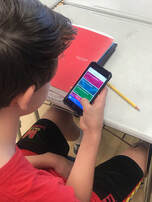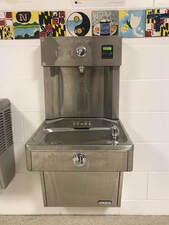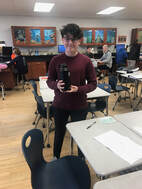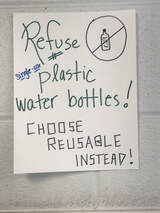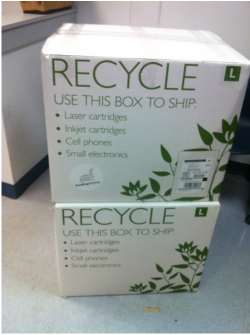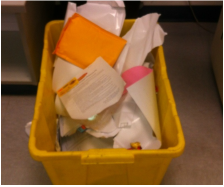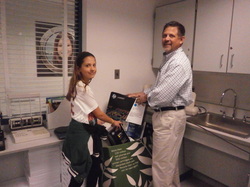Student-Driven Practices: 2.3 Solid Waste Reduction
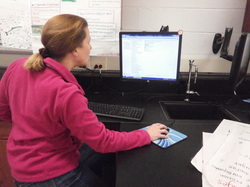 Science teacher Deb Vandenberg reviews a student's research project that was submitted electronically. March 2018
Science teacher Deb Vandenberg reviews a student's research project that was submitted electronically. March 2018
Reduce:
Paper Consumption Reduction & Electronic Communication
Noting the volume of paper consumed through its distribution, members of the student newspaper/literary magazine, The Spark, initiated the discussion to consider other ways to the distribute their product to the 1,500+ SPMS students. Working with their advisors and members of the school administration, the students determined that this important product and communication tool should be available on-line only (accessible through the school website).
The news was spread, and the headline that it was, it caught attention, and better yet, inspired others to follow suit where they could. The monthly parent newsletter went 100% electronic in the 2016 school year. Nearly all teachers post their syllabus and back to school night information solely electronically on Google Classroom and many use it exclusively to post homework assignments and classroom news.
Students have been instrumental in the school transition to a more digital platform. Students and teachers have worked together to master the use of the Google Suite in school. Many assignments that would have required paper are now done electronically. Students and teachers can communicate and edit work through google classroom, saving an extremely large amount of paper. Students are often more knowledgeable with new technology and have helped to ease the transition for some of the teachers. Students also have the option of the Google Classroom application on their smartphone and they use it frequently.
In our classrooms, teachers also take paper reduction seriously. Social Studies teachers label articles “CLASS COPIES”, printing only 40 copies to share rather than the previous 135 to distribute to each student. AVID uses a classroom set of 30 Time for Kids magazines, rather than continuing their former practice of one per student, saving 300 issues each month. Digital learning in all classrooms supports student practice and reinforcement, reducing the use of paper homework. Research papers and other typed assignments are frequently submitted electronically, as seen above.
The cumulative effect is significant.
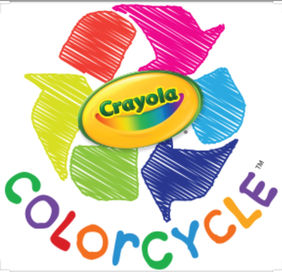
Repurpose: Crayola Color Cycle
Severna Park Middle School continues a partnership with Crayola that helps students better understand their role in protecting the environment. Crayola will collect used markers for free from the school and repurpose them. Students are informed about the program at the beginning of each school year. Collection stations for used/dried markers are set up in each classroom. It has become second nature to place the markers in the collection bins and not throw them away. Three times a year, students collect all of the markers, count them and box them. They securely close the boxes and affix a Federal Express Label provided free by Crayola. The boxes are sent back to Crayola to be repurposed, eliminating a large amount of plastic trash. Over 3000 markers a year that could have become trash in a landfill are sent back to Crayola for repurposing.
Severna Park Middle School continues a partnership with Crayola that helps students better understand their role in protecting the environment. Crayola will collect used markers for free from the school and repurpose them. Students are informed about the program at the beginning of each school year. Collection stations for used/dried markers are set up in each classroom. It has become second nature to place the markers in the collection bins and not throw them away. Three times a year, students collect all of the markers, count them and box them. They securely close the boxes and affix a Federal Express Label provided free by Crayola. The boxes are sent back to Crayola to be repurposed, eliminating a large amount of plastic trash. Over 3000 markers a year that could have become trash in a landfill are sent back to Crayola for repurposing.
Reuse/Recycle: Recycling in 3-D Sculpture Contest
The Anne Arundel County Department of Public Works created a contest asking students to use recyclable materials from their home to depict a scene from the Chesapeake Bay. Several sixth graders entered the contest and created some amazing artwork! One of our sixth graders, Ryan J. actually won the contest and received a $300 prize. Students will then vote on the projects and choose 2 to compete in the Blue Heron Art Gallery. Winning projects will be displayed in the County Executive's Offices.
Recycling in 3-D Contest Rules/Application
Blue Heron Art Gallery Contest
Recycle:
Students and Faculty Alike Make Recycling a Habit
Cafeteria: Students are well-versed in how to separate out trash/compost/recycle and make sure to deposit by-products and packaging into the right container in the school cafeteria.
HP Planet Partners Program: In all faculty copy/print rooms throughout the building, SPMS encourages recycling paper, and cardboard. Printer and toner cartridges are also recycled. The students in our Environmental Club lead the collection process of these materials. HP provides a free and convenient way to recycle. They send the school special boxes for collection. Once the boxes are filled, students get them ready for shipment back to HP. Postage is provided by the company.
Box request for cartridges
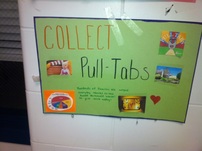 2018: the M&M's team is collecting pull-tabs from recycled aluminum cans.
2018: the M&M's team is collecting pull-tabs from recycled aluminum cans.
Grade Specific Service Learning
Each student at SPMS participates in service learning annually. Many of the service learning projects are related to the environment directly, but even ones that are not explicitly green are frequently intertwined. Here, see a poster promoting the 8th grade project to support the Ronald McDonald House. The students collected and recycled aluminum can pull tabs as a fundraiser. Through this effort, students remind others of the importance of recycling the entire can, at home, school or out and about, and to bring the tab to school, helping the earth and also helping kids in need.
Each student at SPMS participates in service learning annually. Many of the service learning projects are related to the environment directly, but even ones that are not explicitly green are frequently intertwined. Here, see a poster promoting the 8th grade project to support the Ronald McDonald House. The students collected and recycled aluminum can pull tabs as a fundraiser. Through this effort, students remind others of the importance of recycling the entire can, at home, school or out and about, and to bring the tab to school, helping the earth and also helping kids in need.
